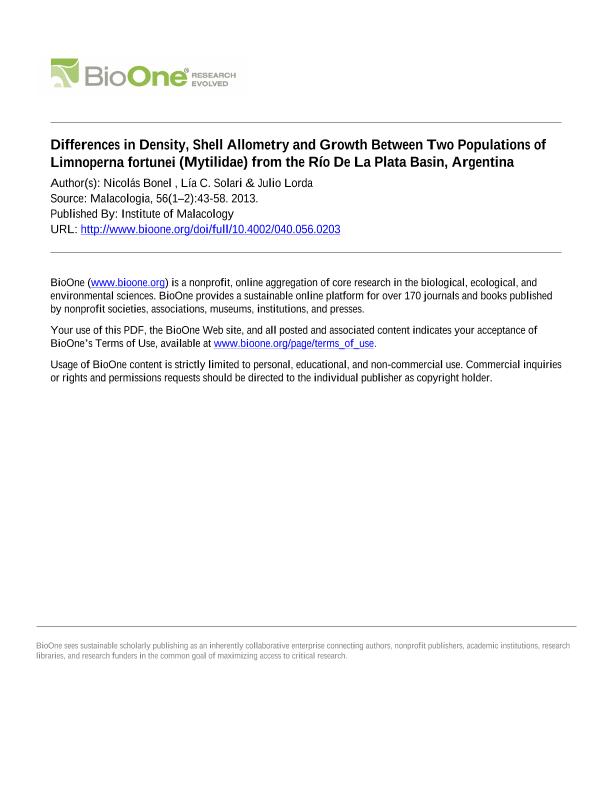Artículo
Differences in density, shell allometry, and growth between two populations of Limnoperna fortunei (Mytilidae) from the Río de La Plata basin, Argentina
Fecha de publicación:
12/2013
Editorial:
Institute of Malacology
Revista:
Malacologia
ISSN:
0076-2997
Idioma:
Inglés
Tipo de recurso:
Artículo publicado
Clasificación temática:
Resumen
The invasive freshwater mussel, the mytilid Limnoperna fortunei (Dunker, 1857), has a great capacity for colonizing a wide range of aquatic environments because of its dispersal ability, high fecundity and wide range of physiological tolerances. Most of the biological and ecological studies of L. fortunei, having been restricted to specific locations, lack comparative analyses among different habitats. In this investigation, we examined the differences in larval density, density in settlement plates, shell allometry, and growth between two populations from the Rio de la Plata basin, Argentina. One of the populations inhabited a heavily polluted area, whereas the other a moderately polluted area. We predicted that the density and growth of the golden mussel would be lower in the heavily polluted environment, expecting therefore to find variations in shell allometry as a consequence of differences in density and environmental conditions between the sites investigated. We accordingly found that the larval density, the density of settled individuals, and the growth were lower in the more polluted environment. We also observed allometric differences because the individuals from the moderately polluted area with higher population densities were more elongated (i.e., with a higher shell length-to-width ratio). The golden mussel tolerates a wide range of environmental conditions and can survive in many polluted water bodies where other invasive species cannot. The findings presented here support the idea that L. fortunei can inhabit heavily polluted environments, but at the expense of a significant decrease in its biologic potential.
Archivos asociados
Licencia
Identificadores
Colecciones
Articulos(CCT - BAHIA BLANCA)
Articulos de CTRO.CIENTIFICO TECNOL.CONICET - BAHIA BLANCA
Articulos de CTRO.CIENTIFICO TECNOL.CONICET - BAHIA BLANCA
Articulos(ILPLA)
Articulos de INST.DE LIMNOLOGIA "DR. RAUL A. RINGUELET"
Articulos de INST.DE LIMNOLOGIA "DR. RAUL A. RINGUELET"
Citación
Bonel, Nicolás; Solari, Lía Cristina; Lorda, Julio; Differences in density, shell allometry, and growth between two populations of Limnoperna fortunei (Mytilidae) from the Río de La Plata basin, Argentina; Institute of Malacology; Malacologia; 56; 1-2; 12-2013; 43-58
Compartir
Altmétricas




